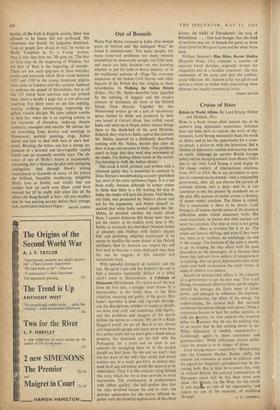Out of Bounds
WHEN Ved Mehta returned to India after several years of Oxford and 'the indulgent West,' he found it unsatisfactory. Too many people, too many stone-wall problems; too many enemies uninhibited by democratic scruple; too little land, and much too little decision—no one knowing whether to put his faith in heavy industry or in the traditional patterns of village life, everyone suspicious of the Indian Civil Service and other legacies of the British Raj but clinging to them nevertheless. In Walking the Indian Streets (Faber, 15s.) Mr. Mehta describes how, appalled by the whining of beggars and the evasive answers of statesmen, he turns to his Oxford friend, Dom Moraes. Together the two Westernised writers go on a sort of reactionary spree; fuelled by drink and protected by their own brand of Oxford idiom, they rollick round India and wind up in Nepal, where chance brings them to the death-bed of the poet Devkota. Sobered, they return to India; and at this juncture Mr. Mehta, inspired by a (brilliantly described) meeting with Mr. Nehru, decides that after all there is hope and promise in India. 'The problems aren't so huge that they need stop movement of the limbs. I'm finding elbow room in the crowd. I'm learning to walk the Indian streets.'
This book is brief, pointed, and written with a reluctant gaiety that is somewhat in contrast to Dom Moraes's swashbuckling account (published last year) of the same spirituous fugue. It is a sad book really, because although its author comes to think that there is a life waiting for him in India, the reader will have his doubts. Ved Mehta, one feels, was persuaded by Nehru's charm and not by his arguments; and Nehru himself re- marked that while India needed people like Mr. Mehta, he doubted whether she could afford them. I cannot elaborate this theme here; but to put the matter at its crudest level, how is Mr. Mehta to reconcile his cherished Oxonian habits of pleasure and intellect with India's chaotic filth and persisting religious fanaticism? If he means to sacrifice the more dainty of his Oxford attributes, then he deserves our respect but will first need to become a more dedicated man than the one he suggests in this talented and melancholy book.
With splendid disregard of morality and the law, Margaret Lane and her husband set out to find a treasure supposedly hidden in a tribal chief's tomb in Mozambique. A Calabash of Diamonds (Heinemann, 25s.) takes us all the way from the first clue, a scrappy chart drawn by a beachcomber in the South Seas, to the final violation, sweating and guilty, of the grave. Mrs. Lane's narrative is clear and vigorous through- out, the descriptions, whether of scenes or people, are done with craft and sometimes with dignity, and the problems and dangers of the search titillate the nerves to a nicety. We are in a Rider Haggard world: we are all, that is to say, decent and respectable people who have never even been in a police court, but we don't give a damn whose property the diamonds are (to hell with the Portuguese, for a start) and we exult in our schemes for smuggling them on to the market should we find them. (In the end we don't—but not for want of the will.) Our social and moral notions are, in a word, pre-1914, as indeed they must be if any adventure worth the name is to be undertaken. Thus it is the attitudes lying behind this story which for me at least provide its main fascination. The combination of predatoriness with `officer quality'; the half-spoken idea that the risks involved excuse the end in view; the genuine admiration for the native African to- gether with the thankful pitnIctitntinn of hic/
labour; the whiffs of Tweedsmuir, the tang of Birkenhead. . . . One had thought that this kind of territory was out of bounds for good, so three times three for Margaret Lane and her sheer brass neck.
William Sansom's Blue Skies, Brown Studies (Hogarth Press, 25s.) contains a number of separate travel sketches, originally written for magazines and of a familiar treatment : the nice assessment of the scene and then the sophisti- cated reflection. Mr. Sansom is far too gifted and serious a writer to bother with resurrecting these pleasant but largely commercial trivia.
SIMON RAVEN






































 Previous page
Previous page